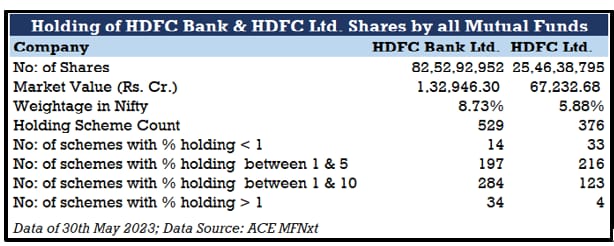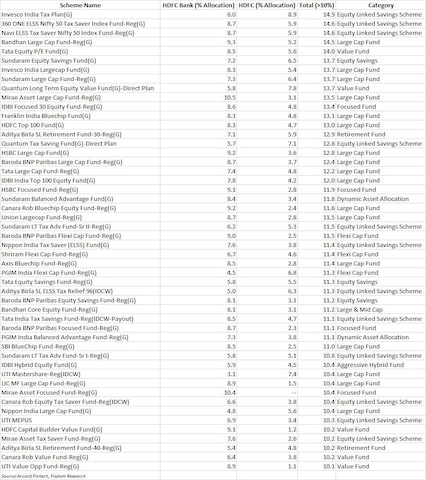How HDFC-HDFC Bank merger will impact equity mutual funds
“There is no material evidence to suggest that the merger and the resultant increase in their holdings in the much larger HDFC Bank needs any special attention since only a few schemes will have marginally larger than the permissible 10 per cent holding,” she said, adding “and none of them will have more than 12 per cent holdings in the merged bank.”
The combined shares of the HDFC twins will have the highest weighting on the indices at over 14 per cent, much higher than the present index heavyweight Reliance Industries with a tad more than 10 per cent weighting.

A Business Standard analysis shows that around 60 mutual fund schemes will hold Rs 5,000 crore worth of HDFC Bank shares beyond Sebi’s prescribed limit post merger.

Of all the 60 Mutual funds part of this holding, the largest share will be of Mirae Asset Large Cap Fund – Reg(G) worth Rs 1,231 crore, while HDFC group’s HDFC Top 100 Fund(G) is the second-largest holder worth Rs 720 crore.
“Our back of the envelope calculations suggest about Rs 50 bn of selling by domestic MFs,” said Prabhat Anantharaman, CFA, MOFSL. “HDFC Bank’s 30-day average daily turnover (ADTV) is US$ 330mn and HDFC Ltd’s is US$ 130m. The combined ADTV can be U$ 450m-500m.”
“In the coming month, several mutual funds may need to reduce their investment in HDFC Bank due to regulatory restrictions on holding excessive shares of a single stock. While there are not many actively managed funds that currently exceed the prescribed threshold for combined exposure, those that do are typically classified as large-cap funds or managed with a focus on large-cap stocks. The higher exposure in these funds can be attributed to limited opportunities for strong performance within the large-cap segment,” said Nirav Karkera, Head of Research, Fisdom.
But even in cases where these funds have a higher combined exposure to HDFC Bank and HDFC, the excess allocation is generally not significant. “Any necessary adjustments to reduce exposure are expected to be carried out smoothly with minimal disruption to the overall portfolio,” added Karkera.
As of 30 May 2023, mutual fund schemes collectively held Rs.2 trillion worth of HDFC Bank and HDFC Ltd. shares under various portfolios. The holding count across schemes stood at 529 for HDFC Bank and 376 for HDFC Ltd. The combined weightage of both these entities was 14.61%. The swap ratio is 42 shares of HDFC Bank for every 25 shares of HDFC Ltd. With the merger formalities almost completed, HDFC Bank would operate as a single entity soon.
“As per the norms specified by the capital markets regulator SEBI, for diversified equity funds, the investment in equity shares or equity-related securities of a single company must not exceed 10% of the net assets of the scheme. However, this regulation does not apply to sector-specific or thematic funds. As per the last available data, the number of schemes across all AMCs holding HDFC Bank greater than 10% in their portfolios was 34 schemes, and for HDFC Ltd, only 4 schemes,” said Gopal Kavalireddi, Vice President – Research at FYERS.
Post the HDFC Bank-HDFC merger, a single entity would remain, and diversified equity schemes are expected to make the necessary adjustments to their respective portfolios, bringing down the maximum holding percentage equal to or less than 10%
” While Sebi has not announced any waiver or any special arrangement, investors need not be excessively worried about any possible sell-off. Fund managers have already prepared for this transition and will ensure adequate stability during the process,” said Kavalireddi.
Despite representation from AMFI, SEBI said the available data do not warrant a relaxation.” Given the liquidity of the stock and the merger date announced, Funds can pare their holding without adverse effects,” added Kavalireddi.
HDFC Bank completed its merger on 1 July, with the delisting of HDFC Ltd. on 13 July. The financial services behemoth will become the world’s fourth largest bank by market cap and the country’s second most valued stock as well.
. Back-of-the-envelope calculations by Motilal Osawal Financial Services shows that this would entail the sale of around Rs 5,000 crore by domestic mutual funds.
“HDFC twins’ combined overweight in MF Schemes is to the tune of Rs 4,800 crore. (We) don’t see it as much of a negative price impact event as this much value can easily be traded. Anyway 10% stock level capping was always the case and nothing new,” said Abhilash Pagaria, Head – Alternative & Quantitative Research, Nuvama Institutional Equities. Nuvama research shows that 57 schemes are overweight the combined entity which will be christened HDFC Bank. Some of the prominent schemes are Mirae Asset Large Cap Fund, overweight by Rs 1227 crore, Axis Blue Chip Fund ( Rs 455 crore), SBI Blue Chip Fund ( Rs 378 crore) Tata Equity P/E Fund ( Rs 223 crore) and Aditya Birla SL ELSS Tax Relief ( Rs 169 crore).
Sonam Srivastava, Founder & CEO at Wright Research, believes the merger will impact the Net Asset Value (NAV) due to price fluctuations triggered by the merger.
“Mutual funds might need to rebalance portfolios to align with changes in the benchmark indices. The merger may necessitate sector diversification adjustments for some funds, as their exposure to the banking and financial sector might increase. Multi-cap and focused funds may face heightened concentration risk, and ELSS funds with a lock-in period might experience an impact,” said Srivastava.
Suppose you have invested in a XYZ mutual fund which has invested in a range of stocks, including HDFC Bank and HDFC Ltd, which together make up 15% of the total fund’s portfolio.
Now, with the merger of HDFC Bank and HDFC Ltd, the market reacts positively, and the stock price of the merged entity increases. This would boost the Net Asset Value (NAV) of XYZ Equity Fund, given that the combined HDFC entity forms a significant part of the fund’s holdings. As a result, the value of your investment in XYZ Equity Fund increases.
Additionally, the weightage of the combined HDFC entity in the benchmark index (like Nifty or Sensex) may increase due to the merger. To align with the revised index, the fund manager of XYZ Equity Fund might need to buy more of the merged entity’s stock.
Dharmesh Kant, Head – Equity & Derivative Research, Chola Securities said most of the respective schemes will replicate some index by which the weightage of HDFC Bank will change the post-merger.
“With this, there can be vacancies for new entries into fund schemes and the HDFC will be vacated in a limited space and there could be also many permutations and the other combinations will play a major role in the industry.”
 Loan, Personal Loan, Home Loan, Business Loan,Loans in India Loan in India, Personal Loan, Home Loan, Business Loan, Loans in India,Loan Finance,Loan in India, Get Instant Personal Loan,Home Loan, Business Loans in India
Loan, Personal Loan, Home Loan, Business Loan,Loans in India Loan in India, Personal Loan, Home Loan, Business Loan, Loans in India,Loan Finance,Loan in India, Get Instant Personal Loan,Home Loan, Business Loans in India